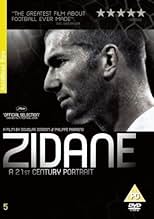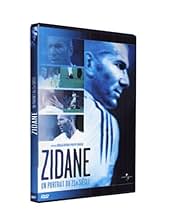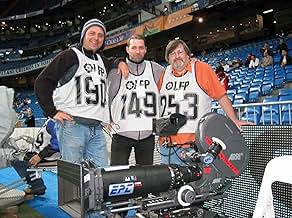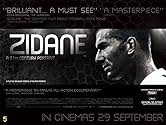Zidane, un portrait du 21e siècle
- 2006
- 1h 30m
IMDb RATING
6.2/10
3.2K
YOUR RATING
Seventeen cameras capture the soccer match between Real Madrid and Villareal, played on April 23, 2005, from the perspective of French superstar Zinédine Zidane.Seventeen cameras capture the soccer match between Real Madrid and Villareal, played on April 23, 2005, from the perspective of French superstar Zinédine Zidane.Seventeen cameras capture the soccer match between Real Madrid and Villareal, played on April 23, 2005, from the perspective of French superstar Zinédine Zidane.
- Awards
- 1 win & 1 nomination total
Featured reviews
I can understand why some people would find this film rubbish, but it really is a fantastic piece of cinema if you just give it a chance.
If what you were expecting was just a montage of Zidane's finest moment this is not what you are looking for. This show's Zidane warts and all - the genius, the aggression, the skill - everything that made him the finest player of our generation.
The title of the film is so apt - it really is a portrait of football's finest "artist" in recent times. It is a little self indulgent, but the cinematography is fantastic and the soundtrack (music and sound) is incredible.
If you have any appreciation for football, Zidane, or even just artistic cinema I'd thoroughly recommend this movie.
If what you were expecting was just a montage of Zidane's finest moment this is not what you are looking for. This show's Zidane warts and all - the genius, the aggression, the skill - everything that made him the finest player of our generation.
The title of the film is so apt - it really is a portrait of football's finest "artist" in recent times. It is a little self indulgent, but the cinematography is fantastic and the soundtrack (music and sound) is incredible.
If you have any appreciation for football, Zidane, or even just artistic cinema I'd thoroughly recommend this movie.
90 minutes of Zidane playing football, the camera on him mostly, hardly any dialogue, and the football is sort of peripheral. It was hypnotic and absorbing, like a modern dance (quite a good sound track) Zidane watching, Zidane bursting with suppressed energy and anger, Zidane running, Zidane arguing with the ref, Zidane smacking other players, Zidane being fouled.
The sound track changed constantly, the raw of the crowd, Zidane scuffing the grass with his boot, Zidane yelling, the thud of 22 pairs of football boots. He hardly talks, smiles rarely, seems to not care about the game, then suddenly does care passionately, maybe a little bit too much, as that got him into trouble at the world cup.
The sound track changed constantly, the raw of the crowd, Zidane scuffing the grass with his boot, Zidane yelling, the thud of 22 pairs of football boots. He hardly talks, smiles rarely, seems to not care about the game, then suddenly does care passionately, maybe a little bit too much, as that got him into trouble at the world cup.
I can see why people had the criticisms of this film.
Reading the title, I think most people expected a clips compilation of his best goals, assists etc. not a moving piece of cinema.
I think this was a brave and ultimately rewarding effort to examine the greatest footballer of our generation in a different way and to enable you to make up your own mind rather than a narrator explaining it for you.
Darius Khondji's cinematography was mind blowing and any of the shots of the film could have made an amazing photo in it's own right. The sound design was phenomenal and if you have fifty pro logic speakers in your sitting room then you will feel the full force of the Bernabeu and Zidane in a way that watching a football match on television never could.
The only thing I can finish with is to say this film must be watched. Mere words can't express the emotions that this film creates.
Zidane: A 21st Century Legend.
Reading the title, I think most people expected a clips compilation of his best goals, assists etc. not a moving piece of cinema.
I think this was a brave and ultimately rewarding effort to examine the greatest footballer of our generation in a different way and to enable you to make up your own mind rather than a narrator explaining it for you.
Darius Khondji's cinematography was mind blowing and any of the shots of the film could have made an amazing photo in it's own right. The sound design was phenomenal and if you have fifty pro logic speakers in your sitting room then you will feel the full force of the Bernabeu and Zidane in a way that watching a football match on television never could.
The only thing I can finish with is to say this film must be watched. Mere words can't express the emotions that this film creates.
Zidane: A 21st Century Legend.
Zidane, un portrait du 21e siècle offers an unusual and surprisingly thoughtful experience, providing a sense of the frustration and isolation of a legendarily talented footballer, but little more.
The film begins with a silent first 15 minutes observing Zidane's skill and movement. It feels rather like you're watching the Skysports player-cam and as such, is a little disappointing. Coupled with the initial jumping back to the perspective of a viewer watching at home, then returning back to the high quality camera POV's, it leaves you somewhat restless, as the director tries to create a hyperbole of space and reality. However, you soon become aware of the human ambiance; Zidane's heavy breathing, feet dragging on the grass like a stag before battle, the visceral crunches of hefty challenges; all creating a very tangible texture.
In a moment after the referee wrongly gives away a penalty, which the opposition score, Zidane approaches and speaks the words "You should be ashamed". Zidane's tone and presence makes this emphatic condemnation almost papal.
There are times in this film when one finds them self checking the time remaining on the DVD player. Whilst being able to appreciate Zidane's awesome touch and effortless ability, the footage is repetitive and too enclosed to really gather a true sense of Zidane's perspective. Those audiences who make it past the 15 minute mark are rewarded when Mogwai's splendid soundtrack kicks in and is complimented by Zidane's subtitled monologue. Here, you really appreciate the fact that they didn't choose an English footballer as their subject. The delicate manner in which french translates, provides a poetic and cinematic syntax. We English are very wasteful with our words and I'm sure if we were hearing David Beckham's thoughts, we would be more spurious at the lack of numerous mentions of "Obviously", "You know" and "fantastic".
At half time the film installs context to the game displaying both violently moving images together with trivial incidents apparently going on elsewhere in the world whilst the game takes place. The intriguing suggestion is that the match, tied with fate, is pointless and memorable like all things.
In truth, after this point, the film has completed it's goal and as such, drags to the finish. The camera work seems dizzying and whilst the intention is to make the viewer feel Zidane's experience, it ultimately fails. Whilst we empathise with his irritation and patience, we are not rewarded like he is, with the thrill of being on the pitch. There is an absence of space and vision, which, would truly mimic his sensation.
Zidane's exit is practically welcome when he is sent off ten minutes before the match finishes, but he leaves with a poetic sense of irony. After a game of fisticuffs, his hot head landing him in trouble like it did at World Cup 2006, we are left with an emotive sense of futility, his sending off - a metaphor for mortality, leaving the pitch to a hero's applause.
I think the film could have benefited from more subtitled speech from Zidane and with the extension of the soundtrack lasting from start to finish. But what hampers this film is it's lack of creating the true experience of space and vision in a football game, in truth, the attempt to re-create Zidane's frustration at not receiving the ball on time and having his passes clumsily lost, is overwhelmed by our frustration at the sense of claustrophobia and detachment.
The film begins with a silent first 15 minutes observing Zidane's skill and movement. It feels rather like you're watching the Skysports player-cam and as such, is a little disappointing. Coupled with the initial jumping back to the perspective of a viewer watching at home, then returning back to the high quality camera POV's, it leaves you somewhat restless, as the director tries to create a hyperbole of space and reality. However, you soon become aware of the human ambiance; Zidane's heavy breathing, feet dragging on the grass like a stag before battle, the visceral crunches of hefty challenges; all creating a very tangible texture.
In a moment after the referee wrongly gives away a penalty, which the opposition score, Zidane approaches and speaks the words "You should be ashamed". Zidane's tone and presence makes this emphatic condemnation almost papal.
There are times in this film when one finds them self checking the time remaining on the DVD player. Whilst being able to appreciate Zidane's awesome touch and effortless ability, the footage is repetitive and too enclosed to really gather a true sense of Zidane's perspective. Those audiences who make it past the 15 minute mark are rewarded when Mogwai's splendid soundtrack kicks in and is complimented by Zidane's subtitled monologue. Here, you really appreciate the fact that they didn't choose an English footballer as their subject. The delicate manner in which french translates, provides a poetic and cinematic syntax. We English are very wasteful with our words and I'm sure if we were hearing David Beckham's thoughts, we would be more spurious at the lack of numerous mentions of "Obviously", "You know" and "fantastic".
At half time the film installs context to the game displaying both violently moving images together with trivial incidents apparently going on elsewhere in the world whilst the game takes place. The intriguing suggestion is that the match, tied with fate, is pointless and memorable like all things.
In truth, after this point, the film has completed it's goal and as such, drags to the finish. The camera work seems dizzying and whilst the intention is to make the viewer feel Zidane's experience, it ultimately fails. Whilst we empathise with his irritation and patience, we are not rewarded like he is, with the thrill of being on the pitch. There is an absence of space and vision, which, would truly mimic his sensation.
Zidane's exit is practically welcome when he is sent off ten minutes before the match finishes, but he leaves with a poetic sense of irony. After a game of fisticuffs, his hot head landing him in trouble like it did at World Cup 2006, we are left with an emotive sense of futility, his sending off - a metaphor for mortality, leaving the pitch to a hero's applause.
I think the film could have benefited from more subtitled speech from Zidane and with the extension of the soundtrack lasting from start to finish. But what hampers this film is it's lack of creating the true experience of space and vision in a football game, in truth, the attempt to re-create Zidane's frustration at not receiving the ball on time and having his passes clumsily lost, is overwhelmed by our frustration at the sense of claustrophobia and detachment.
On the 23rd April 2005, 22 men came out onto a rectangle of grass in front of a crowd of tens of thousands. This walk in the park was the league match between Real Madrid and Vilareal, a game that would see three goals, several bookings and three red cards before those involved were allowed to leave the grass.
Audience expectation is a terrible thing and I think it is one reason why so many viewers seemed to have similar issues with this film. Zidane etc was sold as a football film built around the concept of watching a master at work. The trailer said as much and I think a lot of people tuned in for that reason. However this is not really what the film is about because it was not really made as a portrait of the football of Zidane but rather of the art of Zidane. What this means is that the film is often quite "arty" in delivery and this actually gets in the way of the football and prevented me enjoying it consistently on this level.
At times the footage is great because it doesn't really worry about the football to the degree where all shots are wide and tell you what is happening. It gives a range of shots and, despite their grainy nature, the shots of the television for replays is useful. However I did get the impression that Gordon and Parreno were overly conscious about not just making a clever Match of the Day special and thus they did push the art aspect of the film. This is seen in the decision to show replays by filming a TV screen rather than just filming the action in a normal way and playing it back. Likewise blurry footage, fast cuts, the choice of soothing but bland score, the way that the film gets from crowd noise to babbling commentators and the subtitled thoughts of Zidane.
I found this off putting as it seemed forced and seemed to fly in the face of the fact that this was a film (not an installation), had been marketed as a football film and had been built around one of the finest footballers at the time. This is not to say that it is bad because, as an art piece of filming, these parts work well and, in their place, would be create. Just like the football stuff works well and it is only when it mixes with the art stuff that it falls down. So really it is two good projects but the reason it is only so-so is that it doesn't merge them well at all and indeed both aspects take away from one another rather than enhancing the experience.
It is quite dull at times and the lack of clear audience will be an issue. Those coming for the art side will be bored shirtless by some of the "straight" moments where Zidane is just filming making runs off the ball etc, while football fans will be frustrated by some of the filming and the maker's lack of passion for the man's role within the game. Of course having said that, this works the other way as well with, for example, the football crowd enjoying watching Zidane moving, fighting, kicking, failing, winning etc and the art crowd enjoying that aspect. Just a shame that the project could not have delivered consistently in one way (even if that one way encompassed both these factors) rather than making them feel like distinct aims.
Audience expectation is a terrible thing and I think it is one reason why so many viewers seemed to have similar issues with this film. Zidane etc was sold as a football film built around the concept of watching a master at work. The trailer said as much and I think a lot of people tuned in for that reason. However this is not really what the film is about because it was not really made as a portrait of the football of Zidane but rather of the art of Zidane. What this means is that the film is often quite "arty" in delivery and this actually gets in the way of the football and prevented me enjoying it consistently on this level.
At times the footage is great because it doesn't really worry about the football to the degree where all shots are wide and tell you what is happening. It gives a range of shots and, despite their grainy nature, the shots of the television for replays is useful. However I did get the impression that Gordon and Parreno were overly conscious about not just making a clever Match of the Day special and thus they did push the art aspect of the film. This is seen in the decision to show replays by filming a TV screen rather than just filming the action in a normal way and playing it back. Likewise blurry footage, fast cuts, the choice of soothing but bland score, the way that the film gets from crowd noise to babbling commentators and the subtitled thoughts of Zidane.
I found this off putting as it seemed forced and seemed to fly in the face of the fact that this was a film (not an installation), had been marketed as a football film and had been built around one of the finest footballers at the time. This is not to say that it is bad because, as an art piece of filming, these parts work well and, in their place, would be create. Just like the football stuff works well and it is only when it mixes with the art stuff that it falls down. So really it is two good projects but the reason it is only so-so is that it doesn't merge them well at all and indeed both aspects take away from one another rather than enhancing the experience.
It is quite dull at times and the lack of clear audience will be an issue. Those coming for the art side will be bored shirtless by some of the "straight" moments where Zidane is just filming making runs off the ball etc, while football fans will be frustrated by some of the filming and the maker's lack of passion for the man's role within the game. Of course having said that, this works the other way as well with, for example, the football crowd enjoying watching Zidane moving, fighting, kicking, failing, winning etc and the art crowd enjoying that aspect. Just a shame that the project could not have delivered consistently in one way (even if that one way encompassed both these factors) rather than making them feel like distinct aims.
Did you know
- TriviaThis is born out of a love that co-director Philippe Parreno had as a child when he was watching football matches on TV. He would concentrate on his favorite player and assiduously try to watch as much of him - and just him - throughout the match.
- ConnectionsFeatured in The Story of Film: An Odyssey: Cinema Today and the Future (2011)
Details
- Release date
- Countries of origin
- Languages
- Also known as
- Zidane, un portrait du XXIème siècle
- Filming locations
- Production companies
- See more company credits at IMDbPro
Box office
- Gross worldwide
- $689,094
- Runtime1 hour 30 minutes
- Color
- Sound mix
- Aspect ratio
- 2.35 : 1
Contribute to this page
Suggest an edit or add missing content

Top Gap
By what name was Zidane, un portrait du 21e siècle (2006) officially released in Canada in English?
Answer




















